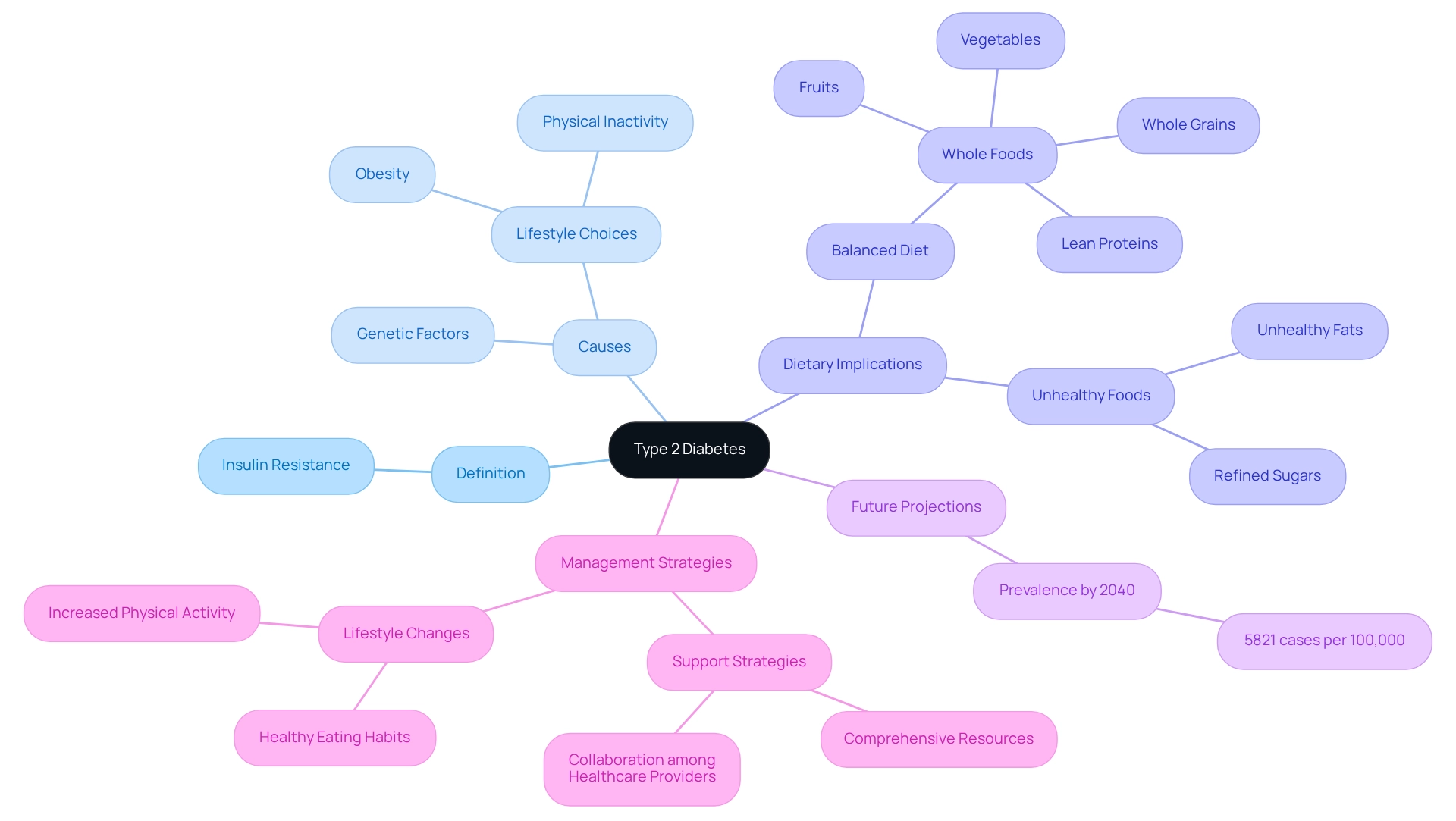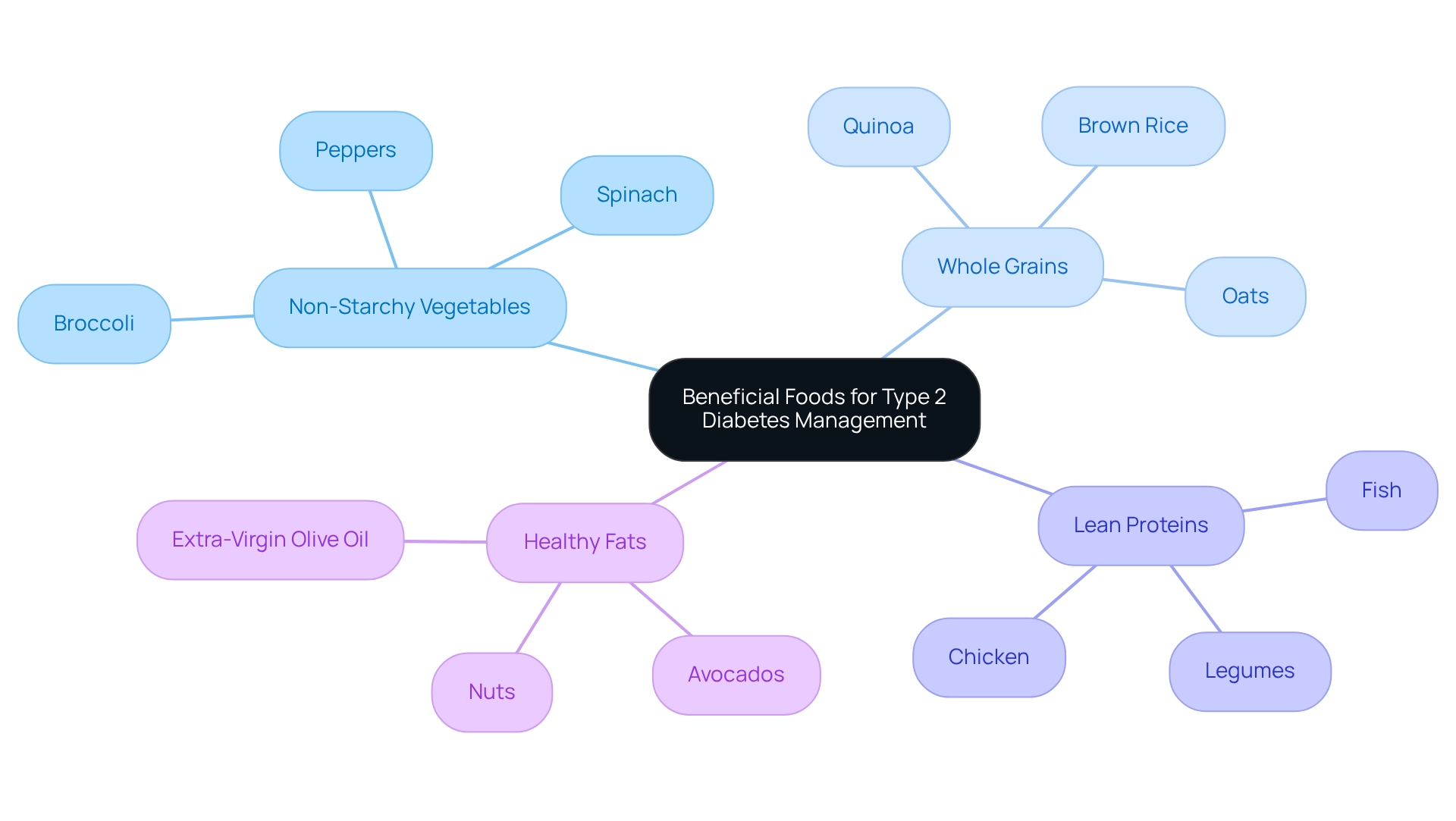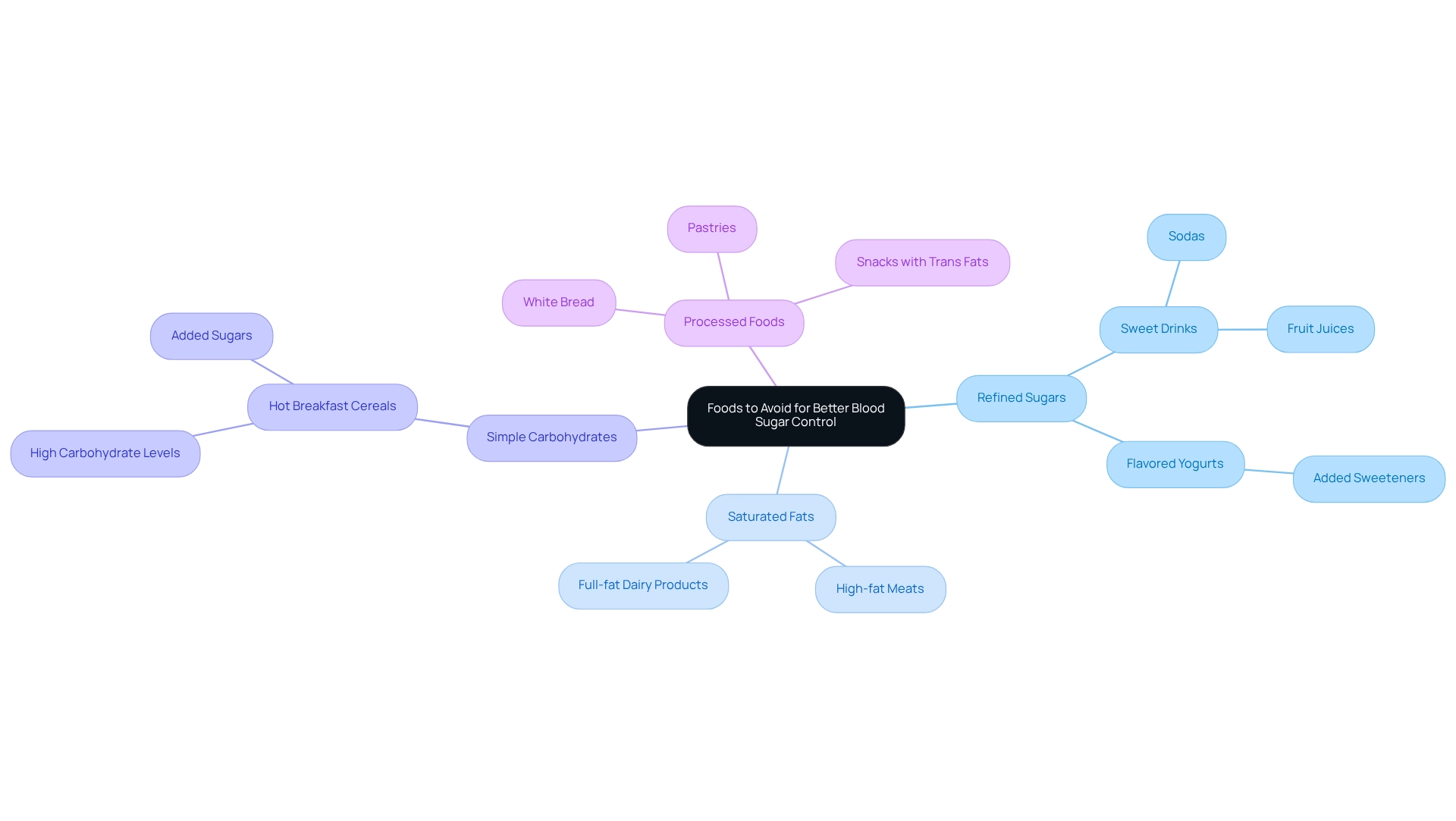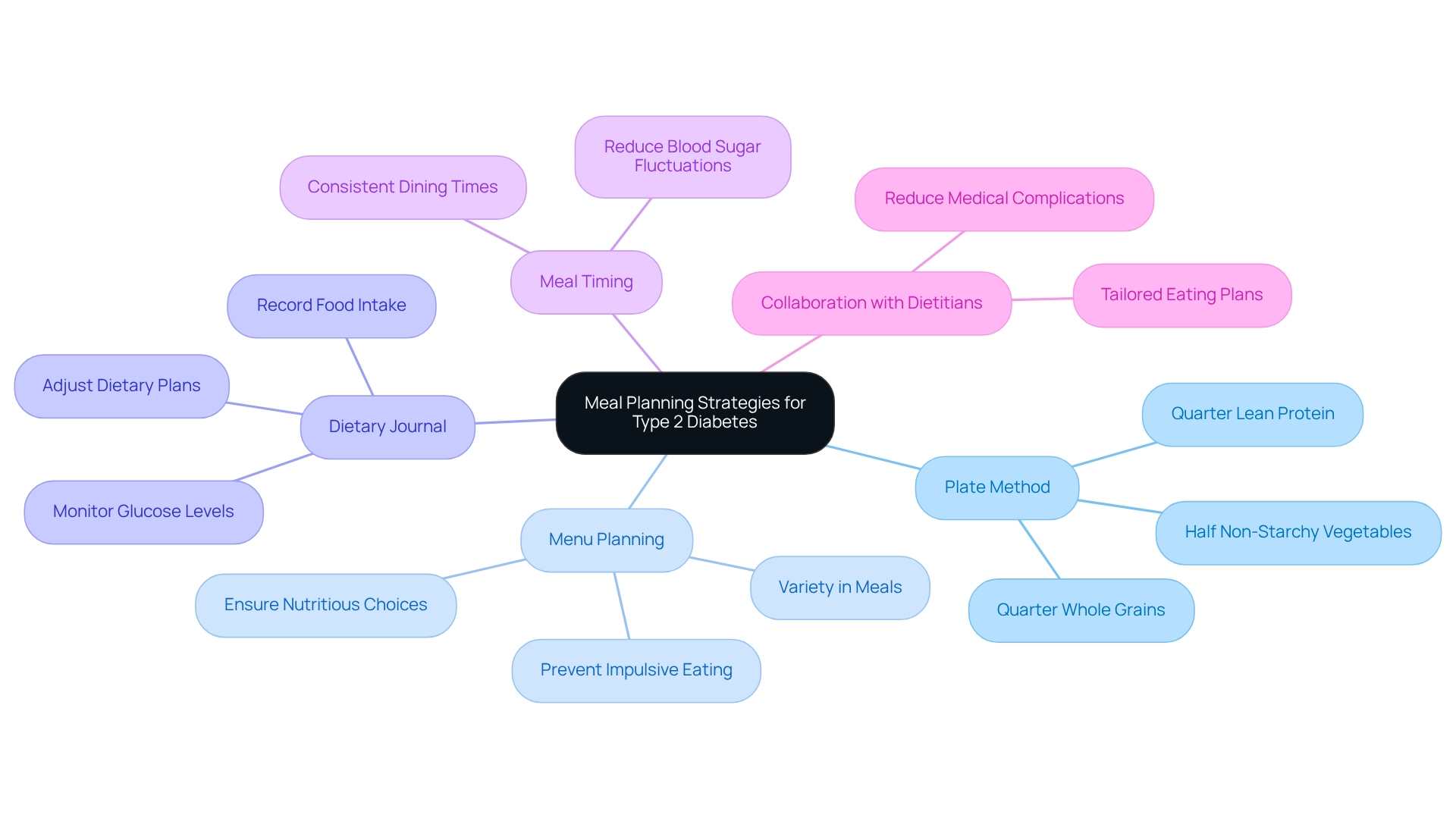Overview
This article highlights the vital role that dietary choices play in managing Type 2 Diabetes. It’s essential to understand that adopting a balanced diet, rich in whole foods, can significantly impact your health. By steering clear of refined sugars and unhealthy fats, you can take meaningful steps toward controlling your blood glucose levels and enhancing your overall well-being.
You're not alone in this journey. Many individuals face similar challenges, and it’s important to know that there are effective strategies to support your health. Embracing a nutritious diet is not just about restriction; it’s about nourishing your body and feeling empowered in your choices. We are here to support you every step of the way.
Consider reaching out for resources or support groups that can provide guidance and encouragement. Sharing your experiences with others can foster a sense of community and help you feel understood. Remember, every small change you make can lead to significant improvements in your health.
Introduction
In a world where Type 2 Diabetes is becoming increasingly common, it’s crucial to understand how diet influences blood sugar management. This chronic condition, marked by insulin resistance, carries serious health risks. However, you can effectively manage it through informed dietary choices.
This article explores essential foods that promote metabolic health and those you should avoid to maintain stable blood sugar levels. Additionally, it offers practical meal planning strategies designed to empower you in taking control of your health.
By prioritizing nutrition and making mindful food decisions, you can enhance your quality of life and reduce the complications associated with Type 2 Diabetes. Remember, you're not alone in this journey; we are here to support you every step of the way.
Define Type 2 Diabetes and Its Dietary Implications
Type 2 Diabetes is a long-lasting condition that many people face, characterized by insulin resistance. This means that the body struggles to use insulin effectively, leading to higher glucose levels. It's understandable that this can be concerning. Typically, Type 2 Diabetes arises from a mix of genetic factors and lifestyle choices, such as obesity and physical inactivity.
As we look ahead, projections indicate that by 2040, the prevalence of Type 2 Diabetes could reach alarming levels, with estimates suggesting 5821 cases per 100,000 individuals. This is a wake-up call for all of us. Dietary choices play a pivotal role in managing blood glucose levels, making it crucial for those diagnosed with Type 2 Diabetes to adopt a balanced diet tailored to their needs. Eating items rich in refined sugars and unhealthy fats can worsen insulin resistance. In contrast, a diet filled with whole foods—like fruits, vegetables, whole grains, and lean proteins—can greatly enhance metabolic health and reduce complications related to Type 2 Diabetes.
Recent studies highlight a concerning trend: the burden of Type 2 Diabetes is increasingly linked to dietary risk factors. This underscores the importance of making informed eating choices. You're not alone in this journey; many are navigating similar challenges. Experts emphasize that unless significant changes are made to address unhealthy eating habits and sedentary lifestyles, the prevalence of diabetes will continue to rise. Therefore, understanding the impact of your dietary choices, particularly regarding Type 2 Diabetes, on insulin resistance is essential for effectively managing Type 2 Diabetes. Remember, we are here to support you every step of the way. Making small, positive changes can lead to significant improvements in your health.

Identify Beneficial Foods for Type 2 Diabetes Management
Effectively managing food type 2 diabetes involves more than just numbers—it's about nurturing your health through the right foods. By incorporating beneficial foods that are suitable for food type 2 diabetes into your daily diet, you can take meaningful steps toward better health. Focus on:
- Non-starchy vegetables
- Whole grains
- Lean proteins
- Healthy fats
Vegetables like spinach, broccoli, and peppers are not only low in calories but also high in fiber, which can help manage your glucose levels. Whole grains such as quinoa, brown rice, and oats provide essential nutrients and improve digestion, supporting your body's natural ability to regulate glucose.
Lean proteins, including chicken, fish, and legumes, play a crucial role in preserving muscle mass and helping you feel full, which can prevent overeating. Healthy fats from sources like avocados, nuts, and extra-virgin olive oil are important too; they contribute to better heart health and metabolic function. Research shows that adding extra-virgin olive oil to your meals can improve glucose control and lower the risk of heart disease, making it a wonderful addition to your dietary plan for managing food type 2 diabetes.
Nutritionists recommend focusing on these dietary categories to prepare meals that not only help regulate sugar levels, particularly for food type 2 diabetes, but also promote overall health. Many individuals who embrace these dietary changes often see significant improvements in their health metrics, such as weight loss and better blood pressure regulation.
Remember, by prioritizing these foods, you are taking proactive steps toward effective diabetes management and enhancing your quality of life. You're not alone in this journey, and we are here to support you every step of the way.

Outline Foods to Avoid for Better Blood Sugar Control
To effectively regulate glucose levels, it's important to avoid food types for type 2 diabetes, which are high in refined sugars, saturated fats, and simple carbohydrates. Sweet drinks, like sodas and fruit juices, can lead to rapid increases in glucose levels, so it's best to be cautious with these choices. Processed foods, such as white bread, pastries, and snacks filled with trans fats, should be limited for those concerned about type 2 diabetes, as they contribute to insulin resistance. Additionally, hot breakfast cereals may have high carbohydrate levels, and adding sweeteners can significantly increase their carbohydrate content, making them less suitable for managing glucose. A study highlights that even seemingly healthy options, like flavored yogurts, often contain extra sweeteners that can complicate diabetes management. Opting for plain Greek yogurt can help reduce sweetener intake while boosting protein, which supports glucose regulation.
High-fat meats and full-fat dairy products can pose further risks, as their saturated fat content increases the likelihood of heart disease—a common concern for those with type 2 diabetes. By steering clear of these items, you can improve your glucose control and lower the risk of diabetes-related complications. It's crucial to check nutrition labels for hidden sweeteners and carbohydrates to make informed dietary choices. As T2DSolutions points out, "This provides you with plenty of nutrition and fiber for a minimal number of calories, which can assist you in maintaining lower glucose levels." By prioritizing healthier options and avoiding harmful foods, you can take proactive steps toward effective diabetes management. You're not alone in this journey; we are here to support you every step of the way.

Implement Effective Meal Planning Strategies for Type 2 Diabetes
Effective dietary planning strategies for food type 2 diabetes can significantly enhance blood sugar regulation and overall well-being. One widely recommended approach is the 'plate method.' This method suggests filling half of your plate with non-starchy vegetables, a quarter with lean protein, and a quarter with whole grains. By using this approach, you not only encourage balanced nutrition but also make meal preparation simpler and more enjoyable.
Planning your menus in advance is essential. It helps prevent impulsive eating decisions that may not align with your dietary objectives. When you plan your meals ahead of time, you can ensure that nutritious choices are easily accessible. Including a variety of items keeps your meals engaging and supports a balanced intake of vital nutrients.
Another useful strategy is maintaining a dietary journal. This practice allows you to record what you eat and observe how different foods affect your glucose levels. By doing so, you can make prompt adjustments to your dietary plans based on your individual reactions. Additionally, setting consistent dining and snack times can help stabilize your blood sugar levels throughout the day, reducing the likelihood of fluctuations, which is crucial for managing food type 2 diabetes.
Studies show that effective food planning can lead to notable improvements in diabetes management. For instance, one study found that individuals who split their dinner into smaller portions experienced a lower incremental glucose peak compared to those who ate one substantial serving (6.78 mmol/L vs. 3.09 mmol/L, p< 0.01). This underscores the importance of food timing and portion management in controlling food type 2 diabetes.
Moreover, case studies indicate that individuals who collaborate with registered dietitians to create tailored eating plans often experience a decrease in medical complications related to food type 2 diabetes. By customizing dietary strategies to meet your unique health goals, you can achieve better outcomes and enhance your quality of life. Remember, you're not alone in this journey. Adopting these meal planning strategies can empower you to take control of your diabetes management effectively. We are here to support you every step of the way.

Conclusion
Diet plays a critical role in managing Type 2 Diabetes, emphasizing the importance of informed and mindful food choices. It's understandable to feel overwhelmed by dietary implications, but incorporating beneficial foods—like non-starchy vegetables, whole grains, lean proteins, and healthy fats—can significantly improve metabolic health and help stabilize blood sugar levels. Conversely, avoiding foods high in refined sugars, saturated fats, and simple carbohydrates is equally essential to prevent spikes in blood glucose levels and reduce the risk of complications associated with diabetes.
Effective meal planning strategies serve as powerful tools in this journey. Approaches like the 'plate method' and keeping a food diary can simplify meal preparation and enhance awareness of food intake. By planning meals in advance and establishing regular eating patterns, you can better manage your blood sugar levels and improve overall health outcomes. Research supports the notion that personalized meal strategies, often developed with the help of registered dietitians, lead to better diabetes management and a higher quality of life.
Ultimately, taking control of your health through dietary choices is not just about managing a condition; it's about enhancing overall well-being. With the right knowledge and resources, you're not alone in navigating your journey with Type 2 Diabetes. You can make choices that promote a healthier future. Empowerment through nutrition is a vital step in achieving long-term success in diabetes management. Remember, we are here to support you every step of the way.
Frequently Asked Questions
What is Type 2 Diabetes?
Type 2 Diabetes is a long-lasting condition characterized by insulin resistance, where the body struggles to use insulin effectively, resulting in higher glucose levels.
What causes Type 2 Diabetes?
Type 2 Diabetes typically arises from a combination of genetic factors and lifestyle choices, such as obesity and physical inactivity.
What are the future projections for Type 2 Diabetes prevalence?
Projections indicate that by 2040, the prevalence of Type 2 Diabetes could reach approximately 5821 cases per 100,000 individuals.
How do dietary choices affect Type 2 Diabetes management?
Dietary choices play a crucial role in managing blood glucose levels. A balanced diet rich in whole foods like fruits, vegetables, whole grains, and lean proteins can enhance metabolic health, while foods high in refined sugars and unhealthy fats can worsen insulin resistance.
What recent trends have been observed regarding Type 2 Diabetes?
Recent studies show that the burden of Type 2 Diabetes is increasingly linked to dietary risk factors, emphasizing the importance of making informed eating choices.
What is necessary to prevent the rise in Type 2 Diabetes prevalence?
Experts stress that significant changes in unhealthy eating habits and sedentary lifestyles are necessary to prevent the continued rise in Type 2 Diabetes prevalence.
How can individuals effectively manage Type 2 Diabetes?
Understanding the impact of dietary choices on insulin resistance is essential for effectively managing Type 2 Diabetes. Making small, positive changes in diet and lifestyle can lead to significant health improvements.



